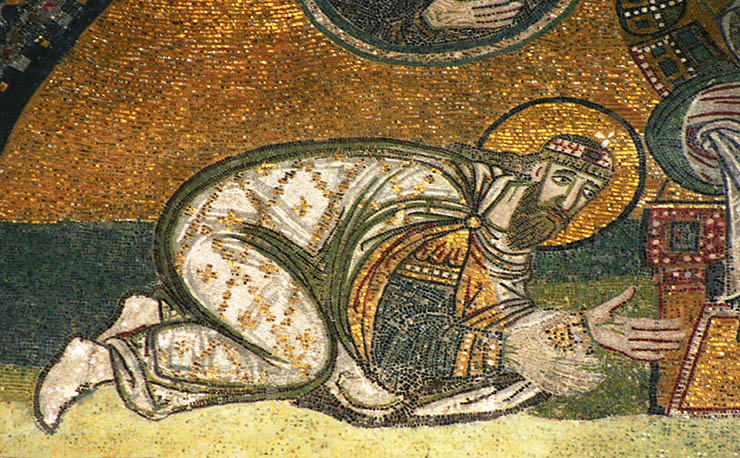 The Empresses of Constantinople by Joseph McCabe
The Empresses of Constantinople by Joseph McCabe
Basil the Macedonian, or Basil the groom, son of a Macedonian peasant of Armenian extraction, enjoyed his imperial wealth, and made excellent use of his imperial power, during nearly twenty years. His story is not one to encourage the venerable adage that honesty is the best policy. But we have dismissed his Empress, Eudocia Ingerina, whose only known features are great beauty and equally great licence in love, and we pass on to review the remarkable series of Empresses whom his son successively married. I say his son, but no historian doubts that Leo VI. was really the son of Michael the Drunkard. The temper of Eudocia Ingerina had been so accommodating that royal genealogists have to indulge largely in arithmetical calculation in order to determine the paternity of her children, or the maternity of Basil’s children. Briefly, Basil’s eldest son, Constantine, was probably a child of the poor Maria who had been sent back to Macedonia with her pockets full of gold, but he died before his father and will not interest us; the second son, Leo, was almost certainly the son of Michael and Eudocia, who had been transferred in a state of pregnancy from the embraces of the Emperor to the embraces of his groom; the third and fourth sons, Alexander and Stephen, were presumably born of Basil and Eudocia; and the four daughters must, in despair, be distributed over the group of parents.
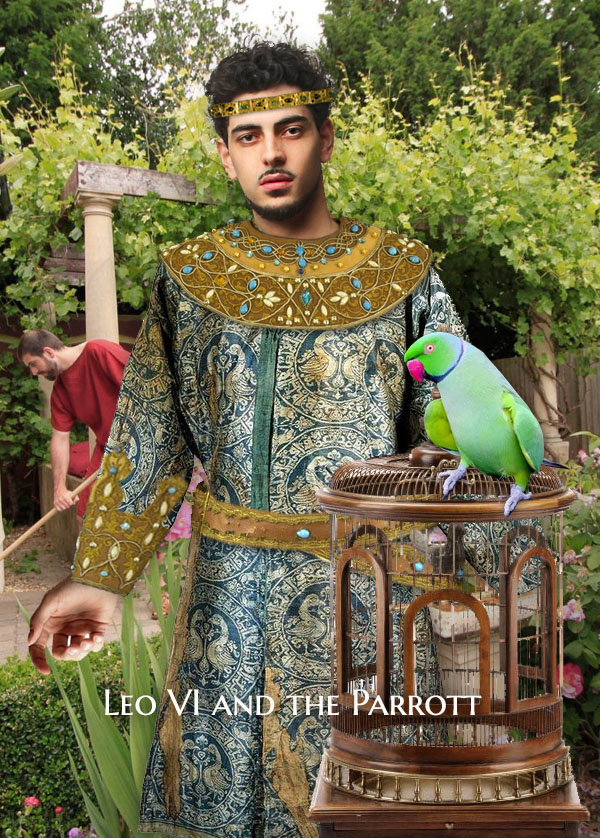 When Leo had reached the age of fifteen or sixteen, his elder brother having died two years before, Basil and Eudocia sought him a wife, and we are at last so121 fortunate as to meet a really blameless Empress, and one whose title to her place in the calendar of the saints will not be disputed by the most irreverent historians of modern times. St Theophano has, moreover, been revealed to us more fully in recent years by the publication of ancient Greek manuscripts that were unknown in the days of Gibbon.20 That they enlarge her virtues and attenuate the vices of her husband is only what we should expect in Byzantine writers of the time, but they enable us to give a satisfactory portrait of an imperial saint and to set it in pleasant contrast to the figures of her contemporaries and successors. Theophano is a stray lily in a garden of roses.
When Leo had reached the age of fifteen or sixteen, his elder brother having died two years before, Basil and Eudocia sought him a wife, and we are at last so121 fortunate as to meet a really blameless Empress, and one whose title to her place in the calendar of the saints will not be disputed by the most irreverent historians of modern times. St Theophano has, moreover, been revealed to us more fully in recent years by the publication of ancient Greek manuscripts that were unknown in the days of Gibbon.20 That they enlarge her virtues and attenuate the vices of her husband is only what we should expect in Byzantine writers of the time, but they enable us to give a satisfactory portrait of an imperial saint and to set it in pleasant contrast to the figures of her contemporaries and successors. Theophano is a stray lily in a garden of roses.
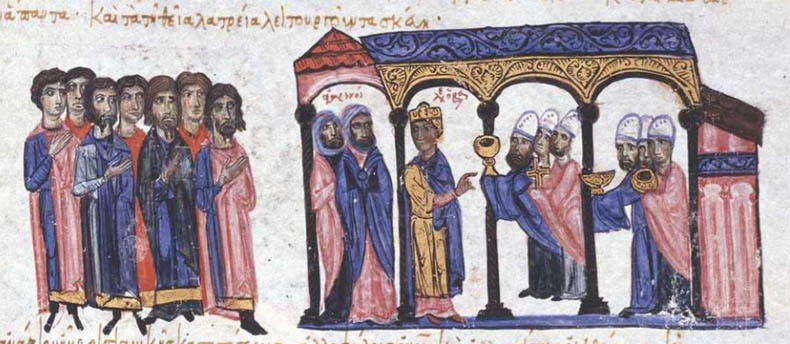 The first wife of Leo was the very pretty and pious daughter of a distinguished noble of the city, Constantinus Martinacius. Her mother had died in her early years, but her education had proceeded on lines of the most orthodox piety, and she had a genius for assimilating its ascetic prescriptions. The piety of her father, however, did not prevent him from putting forward his fifteen-year-old daughter when, in the winter of 881–882, Basil and Eudocia sought a mate for Leo. The city and provinces were, as usual, scoured by the special matrimonial commissioners, and Theophano was one of the dozen maids introduced into the great palace for inspection. Eudocia, a good judge, reviewed them in the Magnaura palace, and selected Theophano and two others. Eudocia’s high birth probably gave her some advantage over the obscure Athenian girl and another rival who ran her close in the competition. She was exhibited to Basil, and he at once placed a ring on her young finger and ordered Leo to marry her. Much subsequent evil might have been avoided if the youth had been consulted. Either the excessive piety of122 Theophano was distasteful to him, or he had already set his mind on another lady. But Basil was never indulgent to Leo, whom he must have regarded as Michael’s son, and the children were married with all the splendid ceremony which the Emperor Constantine describes for us, and entered upon their duty of sustaining the dynasty.
The first wife of Leo was the very pretty and pious daughter of a distinguished noble of the city, Constantinus Martinacius. Her mother had died in her early years, but her education had proceeded on lines of the most orthodox piety, and she had a genius for assimilating its ascetic prescriptions. The piety of her father, however, did not prevent him from putting forward his fifteen-year-old daughter when, in the winter of 881–882, Basil and Eudocia sought a mate for Leo. The city and provinces were, as usual, scoured by the special matrimonial commissioners, and Theophano was one of the dozen maids introduced into the great palace for inspection. Eudocia, a good judge, reviewed them in the Magnaura palace, and selected Theophano and two others. Eudocia’s high birth probably gave her some advantage over the obscure Athenian girl and another rival who ran her close in the competition. She was exhibited to Basil, and he at once placed a ring on her young finger and ordered Leo to marry her. Much subsequent evil might have been avoided if the youth had been consulted. Either the excessive piety of122 Theophano was distasteful to him, or he had already set his mind on another lady. But Basil was never indulgent to Leo, whom he must have regarded as Michael’s son, and the children were married with all the splendid ceremony which the Emperor Constantine describes for us, and entered upon their duty of sustaining the dynasty.
The pious Theophano soon found that life in a court was not a mere monotonous round of ceremonies. The chief friend and adviser of Basil was a compatriot—that is to say, a Macedonian of Armenian origin (Armenian colonies having been transferred, on account of the Saracens, to Macedonia)—named Stylianus Zautzes, and Zautzes had a pretty and lively daughter named Zoe. It is probable that Leo had contracted a boyish love of Zoe before he was forced to marry the young saint, and he was not of a nature to sacrifice the rose to the lily. Not very long after the marriage Theophano complained to Basil, we learn from the life of Euthymius, that her husband was making love to Zoe. Leo naturally protests to the patriarch, and no doubt protested to Basil, that his admiration was Platonic, but we shall see that he did not usually confine himself to that academic emotion. Basil believed the charge, caught Leo by the hair and flung him to the ground, and compelled Zoe to marry, out of hand, a man to whom she was more than indifferent. He was sowing a crop of tragedies.
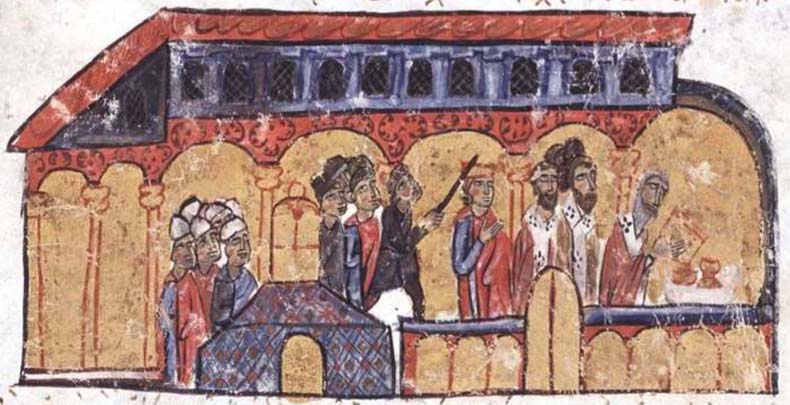 Eudocia died about this time, and the young Theophano took her place in the rich ceremonial of the Court, walking in the endless processions and being borne in the golden litter, drawn by white horses, to the great church and the lesser shrines and palaces. Her new dignity cannot have lasted many months when a fresh and more furious storm broke upon her virtue, and she bore herself admirably. The second most intimate friend and counsellor of Basil was the abbot Theodore, of Santabaris in Phrygia, a very enterprising and peculiar monk. He was a master of magic and was regarded123 with the greatest awe by the Emperor. Leo ventured to urge on Basil that the man was an impostor and humbug, and the chroniclers say that the abbot turned vindictively on Leo. No one was allowed to have weapons in the company of the Emperor, but Theodore persuaded Leo that, if he kept a knife concealed in his boot when he was hunting with Basil, he might be able in an emergency to render a service and disarm Basil’s anger. Leo hid a knife in his boot, and the monk promptly advised Basil to search the prince, as he feared conspiracy.
Eudocia died about this time, and the young Theophano took her place in the rich ceremonial of the Court, walking in the endless processions and being borne in the golden litter, drawn by white horses, to the great church and the lesser shrines and palaces. Her new dignity cannot have lasted many months when a fresh and more furious storm broke upon her virtue, and she bore herself admirably. The second most intimate friend and counsellor of Basil was the abbot Theodore, of Santabaris in Phrygia, a very enterprising and peculiar monk. He was a master of magic and was regarded123 with the greatest awe by the Emperor. Leo ventured to urge on Basil that the man was an impostor and humbug, and the chroniclers say that the abbot turned vindictively on Leo. No one was allowed to have weapons in the company of the Emperor, but Theodore persuaded Leo that, if he kept a knife concealed in his boot when he was hunting with Basil, he might be able in an emergency to render a service and disarm Basil’s anger. Leo hid a knife in his boot, and the monk promptly advised Basil to search the prince, as he feared conspiracy.
So from the palace Leo passed to prison, or confinement in the Pearl palace, and Theophano went with her little daughter Eudocia to keep him company and impress on him the duty of resignation to the divine will. The chroniclers differ as to the length of the imprisonment; some make it three months and others three years. As Zautzes and the Senators intervened and begged Basil to reconsider his verdict, I prefer to accept the shorter term. One of the chroniclers tells us that the most effective pleader for Leo was a parrot, kept in the palace, which someone taught to cry: “Poor Leo, poor Leo.” At all events, Zautzes, and the patriarch Photius, and numbers of the Senators, insisted that Leo was innocent; and he was set at liberty. He was now the obvious heir to the throne. Basil could not put him aside in favour of a younger son without admitting his irregular parentage, and it is not unlikely that the old Emperor had a regard for Theophano. For a few years, therefore, the young Empress continued to rule the great palace, to which Basil had made superb additions, and to practise the high virtues which her husband so little appreciated. Then (in March 886) Basil left his purple robes to Leo, and Leo and his wife and child to the care of Zautzes.
The first concern of Leo the Philosopher—who was no philosopher at all, though he was well read in the letters of the time—was to seek Abbot Theodore of Santabaris. The monk had prudently retired to a124 bishopric in remote Pontus before Leo came to the throne, but he was brought to Constantinople, deposed, scourged, and exiled to Athens, where his eyes were afterwards cut out. It was the punishment he had recommended Basil to inflict on Leo. As the patriarch Photius was believed to have been in league with the monk-magician, he also was deposed, and Leo’s younger brother, Stephen, was made archbishop. Leo’s four sisters had already been turned into nuns by the prudent Basil, and there remained only the second brother Alexander, who was content to await the hour for his own imperial debauch.
Leo’s next care was to renew his pleasant relations with the fascinating Zoe, “the most beautiful woman of her age.” A few added years would have merely ripened her charms, and her father regarded with complacency her promotion to the place of imperial concubine, and continued to discharge his functions as commander of the foreign guards (hetæriarch). To Theophano only was it a grave affliction to find the palace enlivened by the fiery and beautiful oriental. She endured the outrage for some years, patiently working at her embroidery for the altars and spending long hours in prayer, until her one child died, in the winter of 892–893, and she begged Leo to allow her to retire to a convent, leaving him free to marry. Leo was not unwilling, but the patriarch Euthymius foolishly refused to consecrate her, and she languished for a few months longer in her uncongenial world.
The situation is illuminated by a passage in the chronicles which leads up to the first plot on Leo’s life. Some time in 891, apparently, Leo and Zoe and Zautzes, with other members of their family, went to stay at the Damian palace in the suburbs, probably for a hunt. Theophano, the chronicler says, was not with them; she was “busy praying” in the Blachernæ palace, to which she seems to have generally retired from the dissolute Court. For some entirely obscure reason Zoe’s brother125 and his friends concerted a plot against the life of Leo; we can hardly suppose that it was a case of outraged brothers wiping out the dishonour of their sister, seeing that Zautzes himself was a member of the house-party. Whatever the cause was, Zoe, who was sleeping with Leo, heard whispering in the garden without, and, creeping to the window, learned that her brother Tzantzes and others were about to murder Leo. These are the sober details given in the chronicles, but Byzantine history is so full of melodrama that we need not hesitate to accept them. She roused her lover, and they stole from the house and reached Constantinople. Leo suspected that Zautzes himself had been privy to the plot and was estranged from him for some months.
This seems to have been the position during the early years of Leo’s reign: his wife “busy praying,” or mortifying her frail body, in the quieter palace at Blachernæ, while Leo floated over the Sea of Marmora with Zoe in the great pleasure-galleys he had constructed, or wantoned in his various palaces. Theophano died in the seventh year of his reign—on 10th November 893 according to de Boor’s calculations, though her festival is celebrated by the Greek Church on 16th December. The modern mind would be little impressed by an account of the miracles which her remains are said to have wrought after death, nor can one read without a certain amusement that, in the words of a later Emperor and most of the chroniclers, she deserved the aureole of sanctity by “her freedom from jealousy and her patient endurance of the contempt of Zoe.” The nobles of Constantinople would not be unwilling to see such virtues consecrated by the Church. There is, however, no doubt that the daughter of Constantinus Martinacius merited her place in the calendar of the Church, and she is one of the few blameless women to gratify the biographer of the Empresses.
From the saint we pass to the sinner; from “the lilies and languors of virtue” to the “roses and raptures of126 vice.” In the following year Leo violated all decency by taking Zoe into the sacred palace. Her husband, the patrician Theodore Guniazitza, died so opportunely that it was inevitably believed that he had been poisoned; and, although the statement is no more than a rumour, and one may hesitate to-day to admit that “an adulteress may easily become a poisoner,” it cannot be said to be improbable. Leo now approached the patriarch Euthymius on the question of marrying Zoe, and the prelate again blundered, in too narrow a zeal for his ideals, and sternly resisted. He was removed to a monastery, and before the end of 894 Zoe was the legitimate Empress of the Roman world. It was, however, only to enjoy a few more hours of pleasure in the gilded palace. Her father died in the spring of 896, and Zoe followed him in the autumn or winter of the same year, having worn the crown for one year and eight months. For her the ecclesiastical chroniclers have no praise; they affirm that, when men came to lay her remains in her marble sarcophagus, the words “Miserable daughter of Babylon” were found to have been mysteriously carved on the stone. Beautiful, careless and sensual as she was, one may doubt if a single stone could be flung at her if Leo had been allowed to consult his own heart at the time of his first marriage.
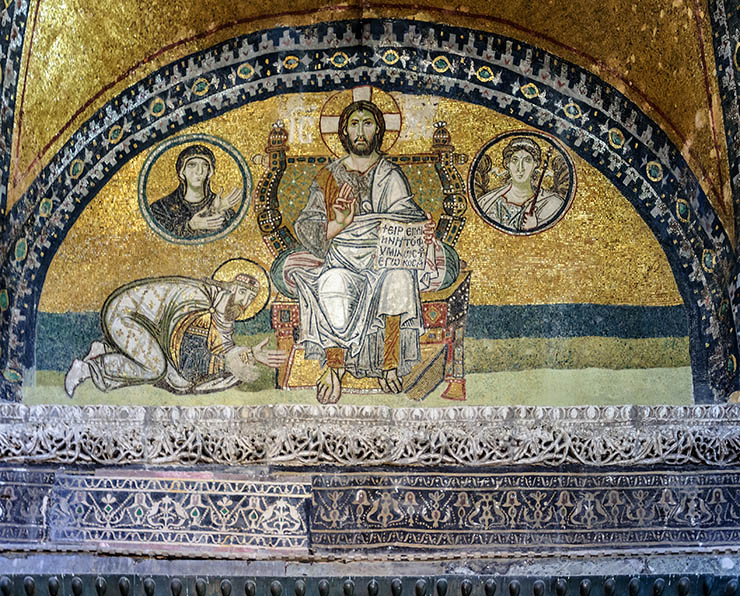 Leo was now, in his thirtieth year, a widower for the second time, and he was little reconciled to that condition. Not only was his dissipated brother Alexander greedily waiting to occupy his throne, but an astrologer had assured Leo that he would yet have a son, and the message of the stars must be fulfilled. Third marriages, on the other hand, were subjected to grave ecclesiastical censure, and for several years the Emperor did not venture to take the forbidden step. Indeed, when he did begin to speak of marriage, Zoe’s relatives and other disappointed courtiers took alarm and plotted against his life. Her nephew Basil had his hair oiled and fired, and all the survivors of the Zautzes family were driven from127 the city. The clearance made room for fresh courtiers, one of whom, a Saracen named Samonas, became the master of intrigue which we almost invariably find in the palace in each generation. One instance of his wit will suffice to make him known and to illustrate life at the Court. The commander Andronicus had taken alarm and fled to the Saracens. Leo had no wish to injure him, and he entrusted a message to that effect to a captive Saracen and bade him deliver it to Andronicus. In order to outwit Samonas, who did not wish the able officer to return and dispute his power, the message was ingeniously enclosed in a wax candle. Before he left Constantinople, however, Samonas told the Saracen that the candle contained a plot against his country, and it was never delivered to Andronicus.
Leo was now, in his thirtieth year, a widower for the second time, and he was little reconciled to that condition. Not only was his dissipated brother Alexander greedily waiting to occupy his throne, but an astrologer had assured Leo that he would yet have a son, and the message of the stars must be fulfilled. Third marriages, on the other hand, were subjected to grave ecclesiastical censure, and for several years the Emperor did not venture to take the forbidden step. Indeed, when he did begin to speak of marriage, Zoe’s relatives and other disappointed courtiers took alarm and plotted against his life. Her nephew Basil had his hair oiled and fired, and all the survivors of the Zautzes family were driven from127 the city. The clearance made room for fresh courtiers, one of whom, a Saracen named Samonas, became the master of intrigue which we almost invariably find in the palace in each generation. One instance of his wit will suffice to make him known and to illustrate life at the Court. The commander Andronicus had taken alarm and fled to the Saracens. Leo had no wish to injure him, and he entrusted a message to that effect to a captive Saracen and bade him deliver it to Andronicus. In order to outwit Samonas, who did not wish the able officer to return and dispute his power, the message was ingeniously enclosed in a wax candle. Before he left Constantinople, however, Samonas told the Saracen that the candle contained a plot against his country, and it was never delivered to Andronicus.
At the beginning of 899 Leo braved the censures of the clergy and, apparently, sent out his commissioners in search of a bride. As a result he married, probably at Easter, a beautiful maiden from the Opsikian district—the region of Asia Minor nearest to Constantinople—named Eudocia. To his great mortification, Eudocia gave birth to a boy, but both mother and child died immediately. The majority of Christian Emperors would have resigned themselves to this third disappointment, but it seems to have increased Leo’s determination. Most historians admit that it was not so much sensuality, which such a man as Leo could easily gratify, as the determination to have a son, which inspired Leo’s defiance of the Church; not impossibly he also had regard to the complaisance of the Western clergy in face of the conduct of the great Frankish monarchs.
It is conjectured by de Boor that Eudocia died about Easter of the year 900, and before the end of that, or in the following, year Leo began to look for another spouse. In place of the patriarch Euthymius, who had resisted his marriage to Zoe, he had appointed a certain Nicholas, an intimate friend of his in earlier years, and he expected the new prelate to be accommodating. Nicholas, however,128 violently opposed the idea of a fourth marriage, and a long and stormy struggle with the Church party followed. On one occasion a man attempted the life of the Emperor in a church, and Alexander and Nicholas were strongly suspected of treachery, but no torture could wring a confession from the assailant.
Leo took a first defiant step by again admitting a lady to the palace. Zoe Carbonopsina, as she was named, seems to have had a humble origin, since her son, the imperial historian, Constantine Porphyrogenitus, cannot devise any genealogy for her. Diligent research, however, finds that she was related to the famous abbot St Epiphanius, the admiral Himerius, and the patrician Nicholas, so that we must not imagine her as a flower transplanted by imperial commissioners from some rural garden. Her later career will confirm the impression she makes on her first entry into the pages of history as mistress of the Emperor. She was a woman of great vigour and faint scruples: a less pleasant type of sinner than the Zoe who had preceded her in the halls of Daphne.
We do not know how long Zoe lived in the palace as Leo’s mistress, nor is it material to seek to determine. It is enough that in the course of the year 905 she promised to become a mother, and Leo renewed his effort to provide a legitimate heir to his throne. The confused and poorly written records of the time merely tantalize us with fragmentary or conflicting statements, and one must present a connected version of the accession to the throne of Zoe Carbonopsina with some hesitation. Apparently (“Life of Euthymius”) the patriarch Nicholas was at first not unfriendly. He blessed the womb which gave promise of an heir, ordered prayers in the churches, and met Zoe without a blush in the palace. These candid details need a short explanation. A bitter feud had set in between the followers of the deposed patriarch Euthymius and the followers of Nicholas, so that an admirer of the former may be trusted129 to say even more than the truth in regard to Nicholas. Leo seems to have promised the clergy that he would put away Zoe as soon as she gave him an heir to the throne. But the biographer of Euthymius professes to throw another light on the situation. A rising took place in the provinces, and Leo secured a letter which proved that Nicholas was involved in it. It was in order to avoid the consequences of this treachery that he submitted to Leo.
A boy, the future Emperor and writer Constantine Porphyrogenitus, saw the light in the course of the year 905—a comet appearing in the heavens, in ominous conjunction, at the time—and in the beginning of 906 he was solemnly baptized by the patriarch, and had his uncle Alexander and some of the highest Senators as godfathers. The modern reader is amazed at the spirit which will permit the heads of Church and State to gather thus in their grandest robes about the cradle of an illegitimate child, yet resist, even to death, a fourth marriage which might supply a legitimate heir to the imperial house; but Byzantine life will exhibit singular features to the end of its history. The child was baptized, and the clergy trusted to hear no more of marriage. To their great anger Leo recalled Zoe to the palace, from which she had been temporarily removed, and found a priest to marry them. At the same time Zoe was made Augusta and Basilissa (Queen) of the Empire.
The clergy now assailed Leo with every invective, and the patriarch forbade him to enter the church. One almost despairs of following the Constantinopolitans through their tangle of scruples and licences, but we find that Leo met the prelate by entering the church at a side door and sitting in a part, apparently, where the singers used to take refreshments. He also sent a request that the Roman bishop and the three patriarchs of the East would pronounce upon the validity of his marriage. When they declared in his favour, and Nicholas still resisted, Samonas consulted his large faculty for intrigue;130 indeed, we may confidently trace the counsel of that wily courtier, a great friend of Zoe, in the whole procedure. Nicholas was invited to dine at the Bucoleon palace, on the shore of the Sea of Marmora. In the middle of the banquet he was again pressed to withdraw, and again refused; and the chamberlain’s servants dragged him down the stairs which led to the palace quay and shipped him to Asia. Euthymius now returned to the see, and, after a decent show of reluctance, recognized the marriage of Zoe. Some of his admirers recount that he was directed in a vision to overrule the law of the Church; others tell us that Leo compelled him by threatening to enact a law that every citizen might have, if he pleased, three or four simultaneous wives. If we change the word “simultaneous” into “successive” we shall not be far from the truth.
The adventurous career of Zoe Carbonopsina now ran quietly for a few years. Her boy flourished, and was, about four years later, associated in the purple with his father. The only event to ruffle the even flow of her pleasant life in the palace was one of those deadly feuds of rival courtiers which were of constant occurrence in the great palace. Samonas had introduced into her service a handsome Paphlagonian named Constantine, and, about the year 911, was alarmed to perceive that this man was supplanting him in the royal favour. He denounced Constantine to Leo for improper conduct with the Empress. In another passage the chronicler has already described Constantine as a eunuch, and it is not the only occasion on which we find this strange charge against an Empress in the chronicles; it may be added that another writer marries Constantine to a cousin of Zoe. Leo, at all events, was convinced, and ordered that Constantine be shaved and put in a monastery. He repented, however, and brought the eunuch back to the palace. In revenge Samonas drew up a libellous writing on the Emperor, and secretly put it in the church. There was great agitation in the palace, especially as an eclipse131 of the moon occurred at the height of the quarrel. Leo the Philosopher trembled and sent for a bishop who was better versed than he in astrology. On this occasion the reader of the stars proved correct. When Samonas intercepted him, and asked whether the darkening of the moon portended evil for him or for Leo, the bishop answered: “You.” In a few days he was betrayed, and he exchanged his hope of the throne for the obscurity of a monastery.
Leo died in the next year, commending his wife and child to the Senators, who swore tearful oaths to protect her and the boy from any misconduct on the part of his successor and younger brother Alexander. But Alexander met no opposition when, as soon as he had ascended the throne, he bade Zoe leave her child and quit the palace. Even the boy had a narrow escape, as Alexander ordered that he should be castrated, but his guardians happily lied to the Emperor and represented that Constantine was too delicate to live. All knew that the reign of Constantine would be short. Although only in his twenty-first year, he had ruined his constitution by vicious indulgence, and the life he led after mounting the throne was killing him. He perished miserably from intemperance within a year, leaving his young colleague to a Council of Regents, from which he had carefully excluded Zoe.
The imperial career of Zoe was, however, by no means closed. A regency was the opportunity of a Byzantine Empress, and Zoe had, no doubt, faithful servants about her boy in the palace. He was now seven years old, and he insisted that his mother must return to the palace. She at once took the lead in the administration, and, having the support of a group of experienced statesmen and several able commanders, she must have looked forward to a long and prosperous rule. At one moment it was gravely threatened with premature extinction. One of the commanders in Asia Minor was invited by some of the disaffected nobles to seize the throne, and it132 seemed to the vigorous Constantine Ducas that the hour long ago promised to him by astrologers had come. He crossed the sea in the night, and had seized the anterior part of the palace before the guards were thoroughly roused. Then one of the regents flung himself upon the intruders with a troop of armed servants and sailors—there seems to have been treason among the guards—and Zoe presently learned that Ducas and, it is said, three thousand of the combatants lay in a lake of blood on the marble floor of the palace. A terrible vengeance purified Constantinople of those who were opposed to the rule of Zoe and her son. Women were shorn, boys castrated, and men hung on gallows along the Asiatic shore for all Constantinople to see.
During several years Zoe seems to have governed with vigour and judgment, but since it is impossible to disentangle her share from that of her servants and counsellors, it would be inexpedient to enter into the prosy details of the administration. A personal note is sounded when we find, in a later page of one of the chronicles, that she was intimate with the admiral, and later Emperor, Romanus. Neither of the two can be regarded as very scrupulous, but it is probable that Bishop Luidprand, who accuses her, is in this hastily retailing the gossip he picked up in Constantinople. A disappointed ambassador is apt to be a libeller.
The behaviour of Romanus in the crisis which, in the year 919, put an end to her reign does not encourage the idea of a liaison. By dexterous diplomacy Zoe had obtained peace with the Saracens and then withdrawn all her forces from Asia, to make a concentrated attack upon the Bulgarians. It was admirable, if not very subtle, policy, since at that time the Saracens and Bulgarians were the upper and nether stones that threatened to grind the Eastern capital between them. Unhappily the jealousy of her two chief commanders betrayed and ruined her. A vast army was assembled at Constantinople, new arms and equipment were supplied, and133 advance pay was liberally given to the soldiers. The cross was borne at their head by the clergy, and, with a last entreaty that all would be faithful to their country, Zoe sent forth the great army which was to begin the restoration of the Empire. And in a few weeks the fleet returned with the news of complete and irreparable disaster. The admiral Romanus had, out of jealousy of the land commander, failed to transfer their northern allies across the Danube; the general of the troops, Leo Phocas, too eager for glory, had attacked without his allies and been utterly routed.
Zoe at once summoned a council and proposed that her alleged lover should lose his eyes for his failure to co-operate. Romanus had, however, a firm hold on the affection of the sailors, and it was judged inexpedient to attempt to displace him. But the position of Zoe was, through no fault of hers, terribly weakened, and a change of government was openly expected. Zoe’s chief hope lay in the fact that the two commanders, Leo Phocas and Romanus, could not share the power, yet neither was likely to suffer the other to occupy it, and for some time matters remained in suspense. Then the experienced intriguers of the palace began to act, and the quarrel hastened to its climax. Constantine, the favourite chamberlain, urged Zoe to build on Leo Phocas (who had married his sister) and take him into the Regency. A rival courtier, the young Emperor’s tutor, Theodore, then espoused the cause of Romanus, and secretly urged him to declare himself the protector of the boy. Zoe ordered Romanus to sail with the fleet to the Black Sea, and, when Romanus pleaded that the pay was in arrears and the sailors disaffected, the chamberlain himself rowed out to the commander’s vessel with the money. He did not return, and Zoe was soon alarmed to hear that the admiral had imprisoned him on the fleet.
The patriarch and Senators were summoned to the palace, and it was decided that their leaders should row out to the fleet and demand an explanation of Romanus.134 By this time the citizens were keenly interested in the quarrel. The fleet lay in sight of all on the Sea of Marmora, and the detention of the chief eunuch of the palace became known and seems to have pleased the people. When the patriarch and the heads of the Senate went down to the quay, they were stoned and forced to retire. Early the next morning Zoe went to the Bucoleon palace, where Constantine and his tutor lived, and demanded an explanation. Strong in the support of the admiral, whom he now induced to draw up the fleet in battle array opposite the Bucoleon palace, the tutor replied insolently that the time had come for Constantine to take the reins; the eunuch Constantine, he said, had ruined the palace and Leo Phocas had wasted the army. Zoe saw that she had lost the battle. She submitted very quietly, except that when the aggressive tutor ordered her to quit the palace she appealed to her son, and was allowed to remain.
Little remains to be told of the fourth wife of Leo the Philosopher. She was for a time an idle spectator, in the palace, of the course of events. The patriarch Nicholas sternly challenged the admiral, and, when he disavowed the charge of treason, invited him ashore to clear himself. In the historic church by the lighthouse a number of the higher officials gathered to hear Romanus swear the “direst oaths” on the true cross that he would be loyal to the young Emperor, and the reconciliation was sealed by Constantine wedding the admiral’s daughter Helena in April (919), a month later. Leo Phocas had meantime retired to the provinces and raised an army. By the characteristically Byzantine device of sending a prostitute with a secret message among his troops, his force was weakened and his rebellion soon trodden out. Zoe now played her last and most desperate card, and attempted the life of Romanus. Some of the chroniclers give the charge as a rumour, but when her son observes that she was “detected” in an attempt to poison the food of Romanus, by means of135 one of his servants, we cannot hesitate to believe it. She was at once removed from the palace, forced to take the vows of religion, and ended her romantic life, at some unknown date, in the monastery of St Euphemia at Petrion.
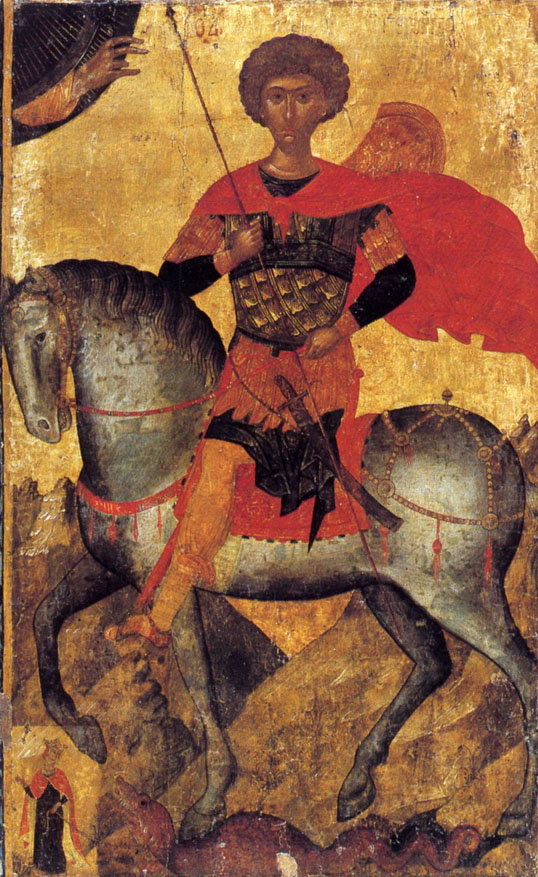
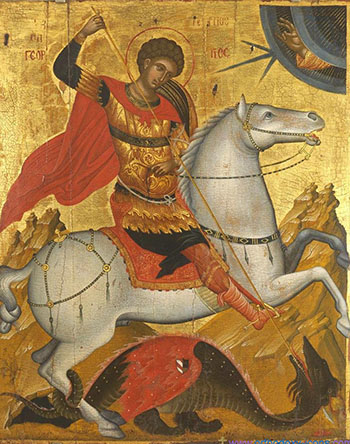
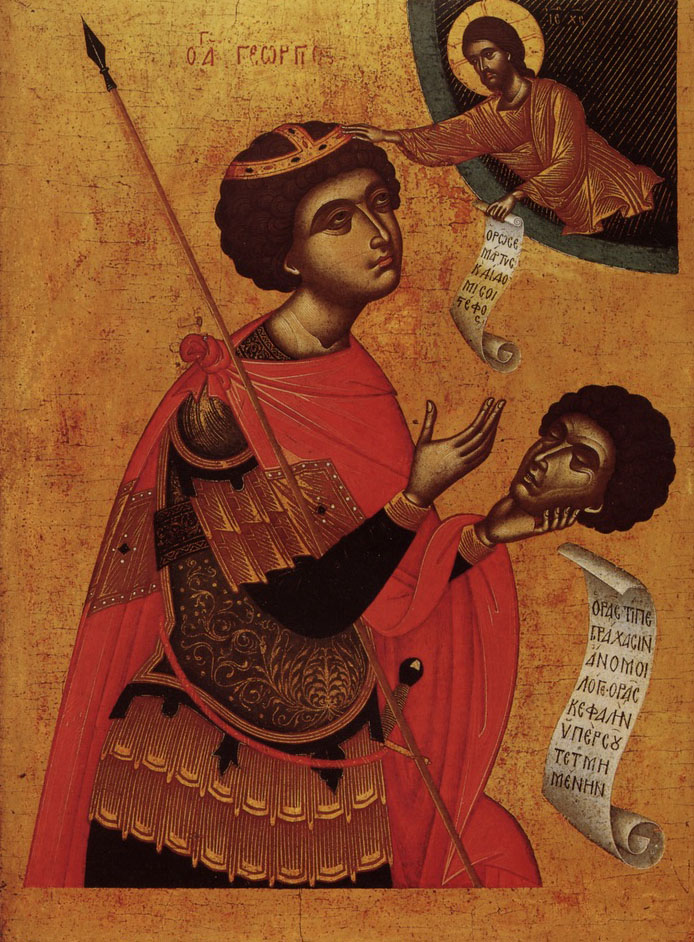
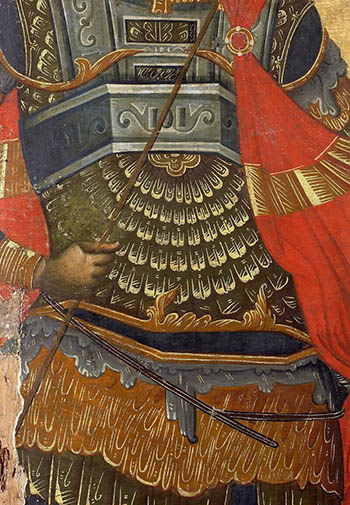
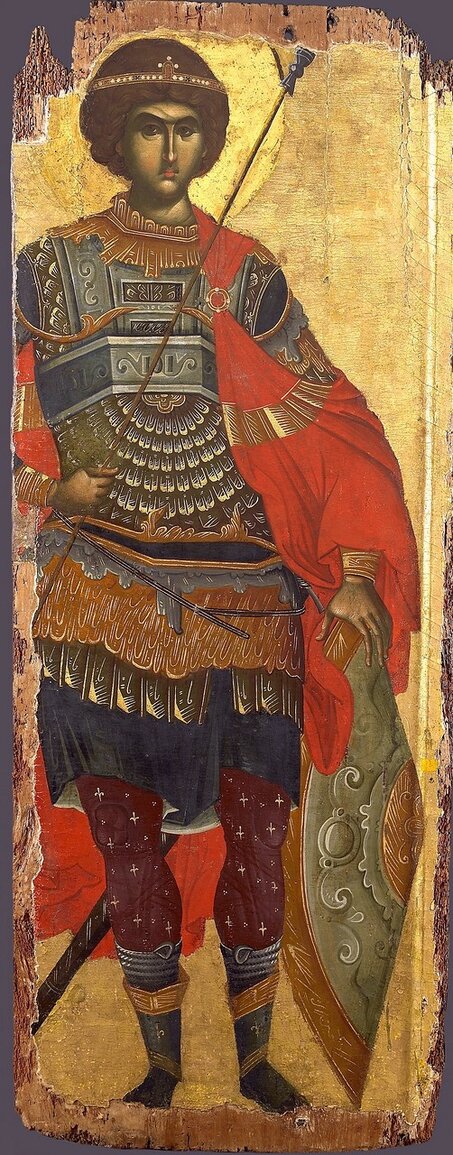
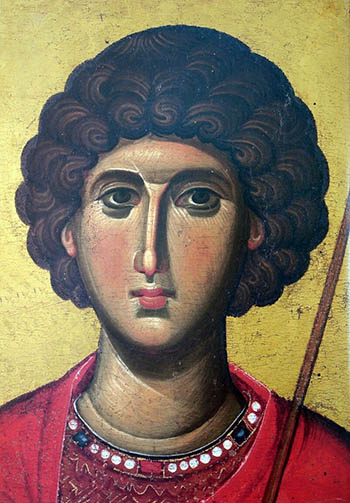
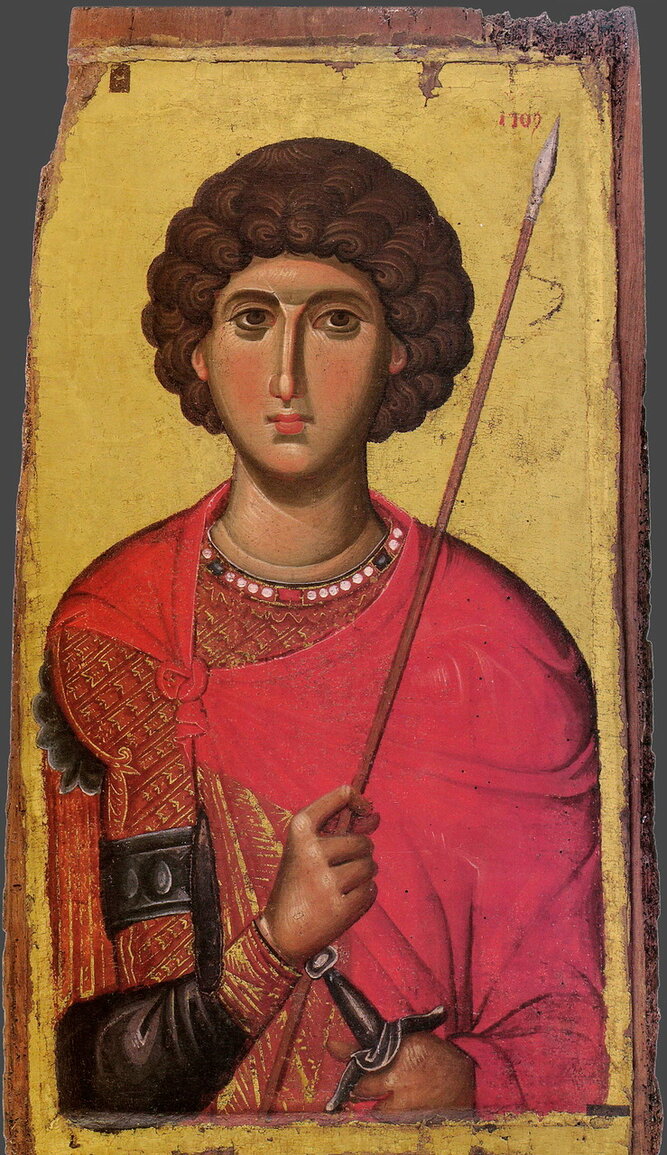
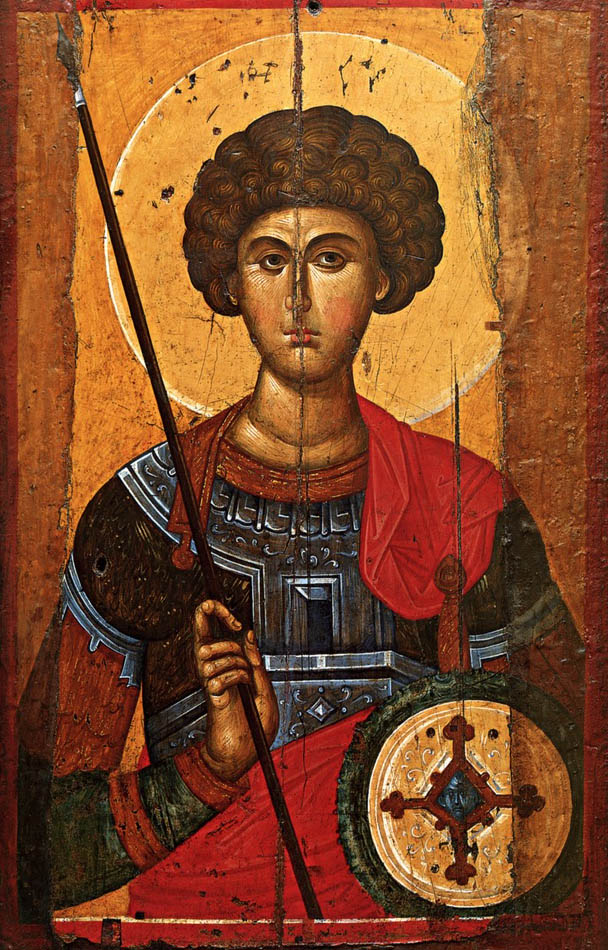
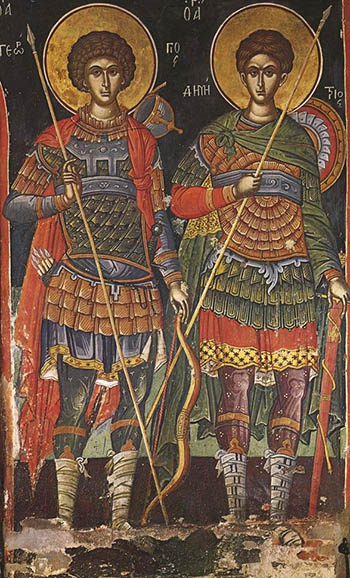
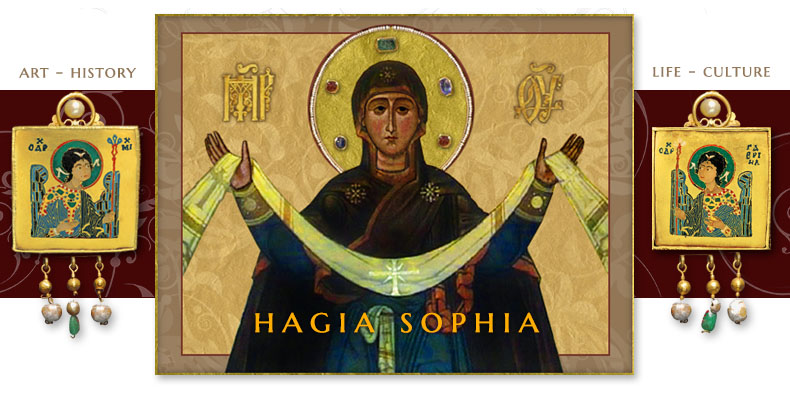
 The Empresses of Constantinople by Joseph McCabe
The Empresses of Constantinople by Joseph McCabe When Leo had reached the age of fifteen or sixteen, his elder brother having died two years before, Basil and Eudocia sought him a wife, and we are at last so
When Leo had reached the age of fifteen or sixteen, his elder brother having died two years before, Basil and Eudocia sought him a wife, and we are at last so The first wife of Leo was the very pretty and pious daughter of a distinguished noble of the city, Constantinus Martinacius. Her mother had died in her early years, but her education had proceeded on lines of the most orthodox piety, and she had a genius for assimilating its ascetic prescriptions. The piety of her father, however, did not prevent him from putting forward his fifteen-year-old daughter when, in the winter of 881–882, Basil and Eudocia sought a mate for Leo. The city and provinces were, as usual, scoured by the special matrimonial commissioners, and Theophano was one of the dozen maids introduced into the great palace for inspection. Eudocia, a good judge, reviewed them in the Magnaura palace, and selected Theophano and two others. Eudocia’s high birth probably gave her some advantage over the obscure Athenian girl and another rival who ran her close in the competition. She was exhibited to Basil, and he at once placed a ring on her young finger and ordered Leo to marry her. Much subsequent evil might have been avoided if the youth had been consulted. Either the excessive piety of
The first wife of Leo was the very pretty and pious daughter of a distinguished noble of the city, Constantinus Martinacius. Her mother had died in her early years, but her education had proceeded on lines of the most orthodox piety, and she had a genius for assimilating its ascetic prescriptions. The piety of her father, however, did not prevent him from putting forward his fifteen-year-old daughter when, in the winter of 881–882, Basil and Eudocia sought a mate for Leo. The city and provinces were, as usual, scoured by the special matrimonial commissioners, and Theophano was one of the dozen maids introduced into the great palace for inspection. Eudocia, a good judge, reviewed them in the Magnaura palace, and selected Theophano and two others. Eudocia’s high birth probably gave her some advantage over the obscure Athenian girl and another rival who ran her close in the competition. She was exhibited to Basil, and he at once placed a ring on her young finger and ordered Leo to marry her. Much subsequent evil might have been avoided if the youth had been consulted. Either the excessive piety of Eudocia died about this time, and the young Theophano took her place in the rich ceremonial of the Court, walking in the endless processions and being borne in the golden litter, drawn by white horses, to the great church and the lesser shrines and palaces. Her new dignity cannot have lasted many months when a fresh and more furious storm broke upon her virtue, and she bore herself admirably. The second most intimate friend and counsellor of Basil was the abbot Theodore, of Santabaris in Phrygia, a very enterprising and peculiar monk. He was a master of magic and was regarded
Eudocia died about this time, and the young Theophano took her place in the rich ceremonial of the Court, walking in the endless processions and being borne in the golden litter, drawn by white horses, to the great church and the lesser shrines and palaces. Her new dignity cannot have lasted many months when a fresh and more furious storm broke upon her virtue, and she bore herself admirably. The second most intimate friend and counsellor of Basil was the abbot Theodore, of Santabaris in Phrygia, a very enterprising and peculiar monk. He was a master of magic and was regarded Leo was now, in his thirtieth year, a widower for the second time, and he was little reconciled to that condition. Not only was his dissipated brother Alexander greedily waiting to occupy his throne, but an astrologer had assured Leo that he would yet have a son, and the message of the stars must be fulfilled. Third marriages, on the other hand, were subjected to grave ecclesiastical censure, and for several years the Emperor did not venture to take the forbidden step. Indeed, when he did begin to speak of marriage, Zoe’s relatives and other disappointed courtiers took alarm and plotted against his life. Her nephew Basil had his hair oiled and fired, and all the survivors of the Zautzes family were driven from
Leo was now, in his thirtieth year, a widower for the second time, and he was little reconciled to that condition. Not only was his dissipated brother Alexander greedily waiting to occupy his throne, but an astrologer had assured Leo that he would yet have a son, and the message of the stars must be fulfilled. Third marriages, on the other hand, were subjected to grave ecclesiastical censure, and for several years the Emperor did not venture to take the forbidden step. Indeed, when he did begin to speak of marriage, Zoe’s relatives and other disappointed courtiers took alarm and plotted against his life. Her nephew Basil had his hair oiled and fired, and all the survivors of the Zautzes family were driven from

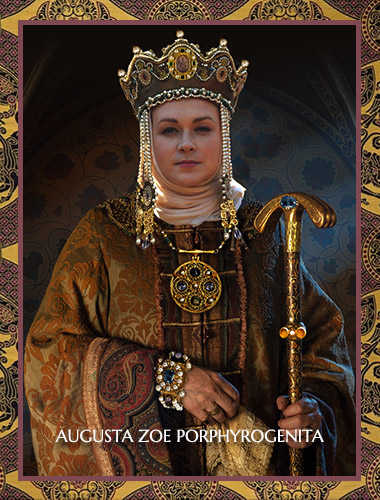

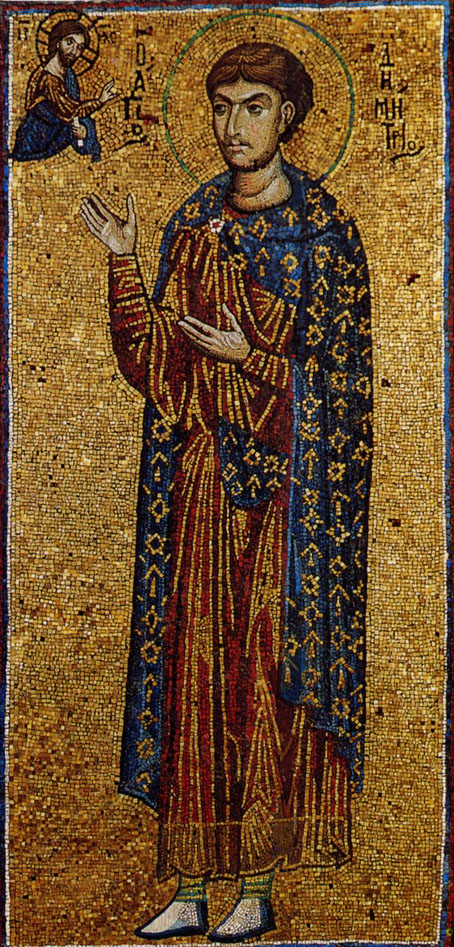
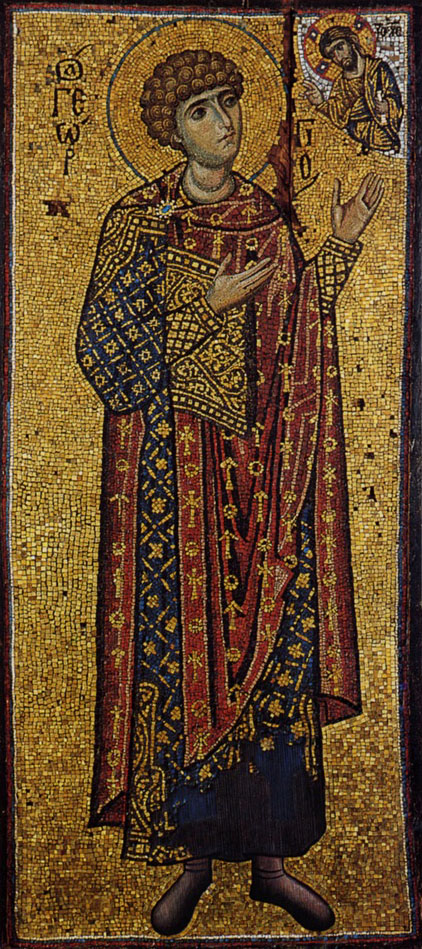
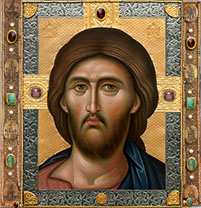 click here for icons of christ
click here for icons of christ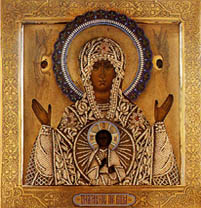 click here for icons of the theotokos
click here for icons of the theotokos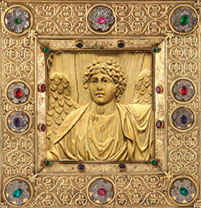 click here for icons of angels
click here for icons of angels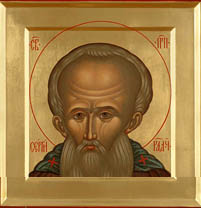 click here for icons of saints
click here for icons of saints








